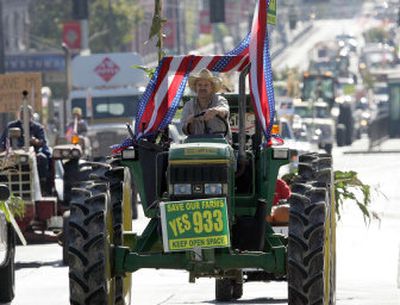Farmers parade for property rights

OLYMPIA – A blocks-long procession of farm trucks and lug-tired tractors trundled slowly through downtown Seattle’s shopping district on Thursday in a rolling demonstration supporting a property rights initiative.
The message: Most farmers support Initiative 933, despite concerns by some that the measure would spur a flurry of lawsuits and subdivisions instead of protecting cropland.
“The handful that oppose it primarily are environmental activists,” said Dan Wood, an official with the Washington Farm Bureau, which authored the measure. “This was written by farmers and ranchers to protect farmers, ranchers – and everyone else.”
The initiative would force state and local governments to either compensate landowners for property value lost to regulations or to waive the rules. Proponents say they’re aiming primarily at recent land-use rules, such as controversial proposals for wide buffer zones around streams. Voters in Washington will decide the fate of the measure in November. Idaho voters face a similar proposal, called Proposition 2.
“This is common sense, and we think common sense will prevail,” said Steve Appel, farm bureau president and a wheat farmer from the Palouse town of Dusty. The group plans another tractor demonstration in Spokane on Oct. 19, and another in Yakima.
Opponents say such “takings” ballot measures are full of vague language and could spawn a land-use free-for-all, leaving many zoning laws and environmental protections toothless. Oregon, which passed a similar measure two years ago, faces billions of dollars in claims from people who typically want to subdivide property in rural areas where lot sizes are usually 20 acres or larger.
Thursday’s Seattle “tractorcade,” flanked by police escorts, brought downtown traffic to a crawl. Farm trucks laden with pumpkins, corn and “Yes 933” signs chugged past high-rise office buildings, Macy’s, Abercrombie & Fitch, and a homeless woman giving an impromptu speech about God.
Snohomish County farmers began organizing the demonstration about a week and a half ago, after some of them were angered by opposition ads featuring farmers urging a “no” vote.
“We had to do something,” said John Postema, a Snohomish County farmer who grows flowers, vegetables and fruit. “We were so upset about that ad.”
In the ad, a fifth-generation Palouse farmer named Aaron Flansburg uses his combine to cut a “NO 933” in letters 300 feet tall in a barley field about two miles south of Palouse.
Flansburg said Wednesday night that he hasn’t caught any flak from fellow farmers for his stance on 933.
“The more they learn about it, the less it sounds like a good idea,” he said.
Farmers are always concerned about neighbors’ land, he said, such as trouble with weeds or fire danger. “But those are small problems, compared with trying to farm around houses full of people who really don’t know what farming’s all about,” he said. And that’s what he fears if 933 passes – looser land-use rules that make it easier to subdivide farmland into residential lots.
Also unconvinced is former Republican state Sen. Cliff Bailey. Bailey, 80, lives near Snohomish on 400 acres farmed by his three sons. His family’s been farming some of that land since 1888, when his grandfather arrived from England.
“I can understand” the frustration, Bailey said. “There are some rules and regulations that probably are onerous on farms. But they’re not insurmountable.”
If I-933 passes, he predicts a “hodgepodge” of development in the Snohomish Valley. With developers suddenly buying up land by the square foot instead of the acre, Bailey predicts, available farmland will shrink. Dealers who sell equipment, fertilizer and feed will go out of business.
Steve Sakuma, whose family runs berry and fruit farms about 60 miles north of Seattle, also opposes the measure. Yes, property rights are a concern, he said. Yes, buffer zones could potentially strip away a large percentage of farmable land with little or no compensation.
“And that’s not right. I understand that,” he said. But he worries that I-933 would make things even worse by waiving land-use regulations. He worries he’ll see more big-box stores spring up on what was once great farm soil.
“Non-farm interests will use it as an opportunity to do things they couldn’t normally do,” he said.
Appel said that the farm bureau has long tried to get state lawmakers to ease land-use laws, only to be rebuffed, year after year. And this initiative was the only way to press the issue, he said.
In fact, he said, the same wording in the initiative was introduced last session as a bill in the Statehouse. “It never even got a hearing,” he said. “That kind of forced our hand.”